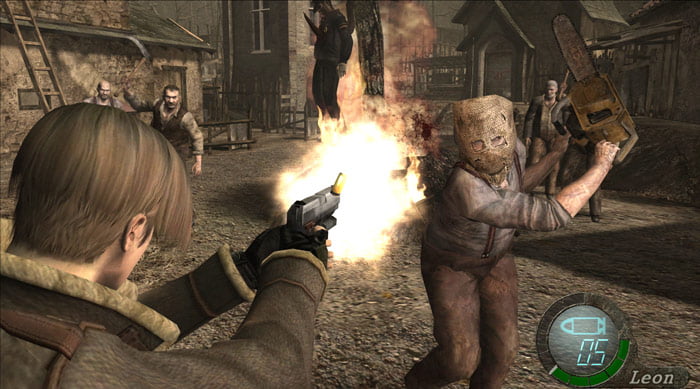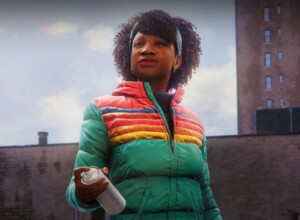Capcom set the bar pretty low when it cemented survival horror as a genre with the original Resident Evil, nearly twenty years ago.
Maybe I’m being a little unfair, but seriously – take a look at those early live-action FMV sequences, listen to the clunky delivery of its equally clunky script – presentationally at least, the game was all over the place, and with hindsight it’s a wonder it sold as well as it did. That B-movie schlock must be part of its charm though, because in its various guises (including director’s cuts and remakes) the first entry into the series has sold in the region of six to seven million copies.

My recent time with the episodically released Revelations 2 (sequel to the Nintendo 3DS spin-off) got me thinking about Resident Evil’s on-going identity troubles. It began as a slow-paced, third-person horror game. A single player affair with quirky controls, fixed camera angles and genuine jump-scares. Now apparently courting the Call of Duty crowd, the main series has evolved into a slicker, more bombastic, set-piece driven co-op shooter that’s more Hollywood blockbuster than B-movie horror. Add to that, a mixed bag of off-shoot games, movies (both live-action and CG) and more besides… who knows where the game is headed next?
Residential Crisis
While the first game came up with its melodramatic, survival horror template, the second refined some of the presentation issues (adding in some great CG cutscenes) and expanded on the scenario, taking the two new protagonists out into the overrun Racoon City. The third title, still on the original Sony Playstation, Resident Evil 3: Nemesis showed clear signs of a more action-oriented approach (Jill Valentine was given dodge and quick-turn manoeuvres) but it was Resident Evil 4, now ten years old, that really redefined the way games like this were made and played. With its over-the-shoulder camera, action-heavy gameplay and quick time eventss, in one fell swoop it both reinvented the third-person shooter and did away with the genre it had helped to establish. These were trends set to continue as the series progressed into the next console generation. The fifth and sixth games attempted to ape the fourth’s success but ultimately fell short of the mark. Critically, at least.

In spite of middling review scores and vocal fanbase concerns about the state of the latest games (as well as the direction of the series as a whole), they still continue to sell in the millions. Both Resident Evil 5 and 6 sold over six million copies each. Even the generally poorly received squad-based shooter Operation Raccoon City sold more than two million. The franchise as a whole is easily Capcom’s biggest seller, selling more copies than its two other best selling games – Monster Hunter and Street Fighter – combined, but it doesn’t really seem to know what it wants to be any more. With its success, Capcom has not been shy in experimenting with the brand, producing multiple spin-offs, a slew of light gun games and score-attack modes to accompany Slant Six’s team shooter. All only serve to further dilute the core concepts of the numbered series.
The Hope Within
There is mounting evidence though, that someone at Capcom is still listening to the old guard. The Nintendo 3DS spin-off Revelations (released in early 2012) saw a return to the tense atmospherics; the deliberately paced exploration favoured by fans of the earlier games, and was widely praised for it. Its HD remaster from mid 2013 sold more than a million copies. More recently we’ve seen the HD remaster (of the Gamecube remake) of the original game break company sales records for digital titles. There has been renewed interest in a remake of Resident Evil 2. On top of all that the new Revelations 2 has received critical praise, cited as something of a return to form.

Now, this newest member of the family might not be the triumphant return for Resident Evil that fans have been waiting for, but Revelations 2 is certainly a confident one. It can hold its head high, striking a fine balance across its four chapters between fraught exploration, orchestrated moments, chaotic combat and knowing series nods. It may not break major new ground, but everything it aims for is solidly achieved. The decision to release the four episodes digitally over a four week period before the boxed retail release, though a little odd, seems to have paid off for Capcom, giving them more column inches than would have been received otherwise.
Future Evils
But does harking back to how Resident Evil used to play (or this current trend of remasters) suggest a new direction for the next numbered game in the series? Or is this just a flavour to be retained for the older fans, trotted out for spin-offs while Resident Evil 7 pulls in the big crowds with all the bullets and explosions they can eat? Is it possible that Capcom is positioning the Revelations spin-off series as a counterpoint to the main series, in an effort to capture the attention of all-comers? Only time will tell.
I’m eagerly awaiting news of the next game. Surely we will hear something of Resident Evil 7 at E3 2015 in June. I’ve nothing against the overblown action-nonsense of the later games, there is fun to be had there, but I hope the developers remember where the game has come from and why it became popular in the first place. I hope they aim to create the best game they can, rather than creating a game for the lowest common denominator in order to maximise shareholder profits. Failing that, there’s always Revelations 3…
Either way Capcom have to be applauded, not discouraged, for continuing to iterate and evolve their best selling franchise. Their output can be hit and miss, such is the nature of any innovation. Much like an Umbrella Corporation test subject, sometimes the result will be an amorphous bubbling mess, not fit for the petri dish it was formed in. I still live in hope that one day they can come up with the super soldier they’ve been striving to reproduce since 2005.






